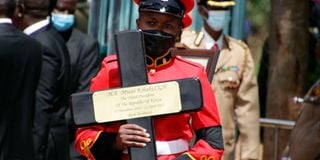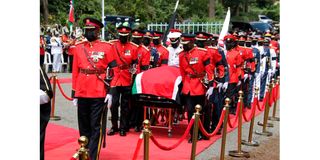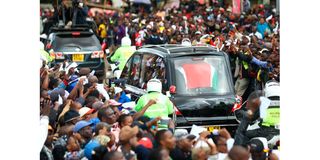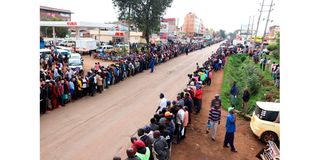Military escorts Kibaki home with great fanfare, precision

A soldier carries a cross during the burial ceremony of former President Mwai Kibaki at Othaya Approved School grounds on April 30, 2022.
When Mwai Kibaki left Thunguri village in Othaya decades ago, he was unknown and armed with nothing, but burning ambition.
He returned home to his final resting place a retired president, with honour and a colourful military escort yesterday.
At 7am, his cortege left Lee Funeral Home where he had been lying for seven days. This would mark the beginning of a long, winding journey through the slopes and valleys of central Kenya, 120 kilometres north of the capital, Nairobi.
At 7.02am, the glossy, shiny-black jaguar hearse, military registration 61 KA 58, emerged from the gates of the mortuary bearing his remains.

Military personnel cary the body of President Mwai Kibaki during his burial ceremony at Othaya Approved School in Nyeri on April 30, 2022.
Unlike the Friday outing that took him to the city folk for a national funeral service, yesterday he was going to meet his kin, who would only marvel at the majestic manner their son was coming home.
It was the culmination of a week of elaborate planning at the state level to accord the former commander-in-chief the highest possible honours.
Incidentally, Kibaki’s cortege drove along Thika superhighway, one of the projects that have marked his rich legacy. The KNH Annex Othaya, now renamed Mwai Kibaki Hospital, just a road away from Approved School Grounds, was his legacy too.
The crowds lining the streets were treated to a grandeur escort fit for a former Commander-in-Chief. Along the Nairobi-Nyeri highway, school children in their uniforms lined up by the roadside to see his escort whizz by.
At the sight of the convoy snaking through the towns, the curious onlookers – men and women, the young and the old alike – waved him goodbye. It was the closest they came to the show of majesty, opulence, and power.
Occasionally, an entourage with police escort would wheel past, raising excitement among the residents, only for them to learn these were dignitaries arriving for the function and not the late president’s convoy.
If residents of Mount Kenya had come out in large numbers to witness the historic moment as the cortege of Kenya’s third president drove past, it is at Karatina, Mukurwe-ini and Gakindu townships where the eagerness was heightened.

Residents of Karatina wave to the convoy ferrying the body of President Mwai Kibaki on April 30, 2022.
The convoy stopped for a few minutes in Karatina for the former first family to refresh. Residents had been waiting for more than three hours to catch a glimpse, lining the roadsides with eagerness.
A heavy police presence in the town ensured that the locals stayed away from the road. The procession was greeted with dirges. ‘‘Jimmy, pole sana,’’ one woman shouted from the crowd, as Jimmy Kibaki acknowledged her with a bow.
The motorcade sped, as the lushy fields in the hills and valleys fell behind. At 10.15am, the cortege arrived in Othaya, to a rapturous reception. A son was returning home after a fruitful sojourn.
Not so in Nyeri town. From Thursday evening, residents of the town knew the cortege would pass here. The police had even erected barriers along Temple Road, the town’s main street, where wananchi would stand as the motorcade passed.
But yesterday morning, many would learn with shock and disappointment that the motorcade had taken the Mukurweini-Othaya route. This meant only one thing: they would not be paying their last respects to the former president.
Many town residents such as Paul Ndegwa went back to their activities dejected. “Why didn’t they allow us to pay our last respects. Kibaki was our son. We feel sad to lose him, but even sadder that we didn’t see his cortege,” lamented Ndegwa, a mechanic.
Mercy Wamuyu regretted waking up early and heading to the town centre to view the cortege. “Many of us came here in the morning eager to receive him and to say goodbye. We still do not know why the route suddenly changed. We are not happy,’’ Wamuyu told Sunday Nation as she got ready to open her pineapple stall.

The public waits for the cortege of former President Mwai Kibaki in Karatina as it proceeds to Nyeri.
At Giakanja and other townships along the way to Othaya, the mood was one of dejection. By 10am, tens of residents, resigned to their fate, walked back by to their homes to go on with the day’s activities.
Approved School Grounds where the funeral was happening witnessed long queues as residents hoped to secure slots. At the gate, mourners were handed a bottle of water, soda and a loaf of bread by National Youth Service officers. Those who arrived here after the service had begun were, however, turned away owing to state protocols.
The family was mourning a unifying figure, the residents were mourning a man who transformed their lives tremendously, and Kenyans shared in their grief.
Ms Jackline Anota chose to forgo the comfort of her house for the love of her former President. She travelled to Othaya and has been spending her nights at Othaya Police Station. She was among the lucky few to find spaces in a tent.
With the crowds that this pulled, the vendors had hoped to make a kill. But they were pushed 300 metres away from the vicinity. The sky was clear and the sun scorching, as the traders stared at a ruined day.
Paul Wanyoike, from Sabasaba in Murang’a County, hoped that the visitors would buy his fruits. By evening, he had only sold Sh200.
When she arrived to see off her younger brother, Waitherero Kibaki – now in her 90s – few people noticed her. In a sea of recognisable dignitaries, Waitherero, who was being assisted to walk, looked the odd one out. Wearing a simple dotted dress, a brown sweater and rubber shoes, Kibaki’s elder sister made her entry into the venue without fanfare.
The mass was conducted using the same altar that was used during Blessed Irene Stefani Nyaatha's beatification. It was also the same one used during Pope Francis's visit to Kenya.
In the tent the Kibaki family, donning black attires, bound by the blood ties, found warmth in being together.
As the day got hotter, restlessness settled in. Some mourners wanted to leave, but the security would not allow them. Patience waned and tension ensued. Then scuffles between security officers and some locals followed.
At the end of the day, the littered compound served as evidence that this mourning venue was also a feasting ground.
Kibaki died four days shy of the sixth memorial of his wife, Lucy Kibaki, who passed on in April 2016. After six years apart, he is now reunited with his wife of 55 years. The two now lie only two metres apart, six feet under.
The long day of elaborate military and religious rites ended with a 21-gun salute that rattled through the quiet village. As the sun came down at twilight, it brought with it Kibaki’s long journey to a quiet, and sombre end.
Additional reporting by Mercy Mwende






